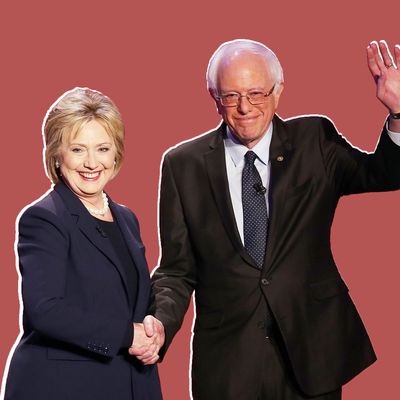
We can’t control what irrationally annoys us any more than we can control our taste in food or music — it’s the result of a thousand invisible factors working in complicated ways. In my case, for the last couple months, I’ve been weirdly, unfortunately fixated on the dumb, bad-faith, please-jam-sporks-into-my-eyes-right-now arguments between Bernie Sanders and Hillary Clinton supporters playing out on my Facebook feed and, to an even greater extent, on Twitter.
What makes me desperate for the sporks is the extent to which many people engaging in online arguments on both sides of the Democratic primary turn into nasty, bullying blowhards incapable of seeing their ideological opponents’ basic humanity. To Bernie fans, Hillary supporters’ only policy goal is to have Wall Street bankers run thousands of drone missions geared at wiping out distant orphans. To Hillary supporters, Bernie fans are motivated only by misogyny and the sort of revolutionary politics that would get you laughed out of even a stoned-freshmen dorm-room debate about politics.
In some cases, I actually know and respect the people engaged in the squabbling — when the subject is something less heated than the primary campaign, they’re nice, reasonable folk capable of holding nuanced views, weighing different options carefully, and so on. But the vortex of online enmity has sucked them in, and I inevitably end up reading their dumb arguments and getting angry when I could be doing more productive things, like searching for examples of different species of animals becoming best friends.
All of which is why I appreciate the gust of cool, rationalizing air provided by Matthew Yglesias’s piece in Vox on Friday. Yglesias explains that, despite all the you’re-Hitler-no-you-are nonsense going on online, when you look at nationally representative samples of Clinton and Sanders fans rather than anec-data plucked from the extremely nonrepresentative sample of people who like to pat themselves on the back for their clever Twitter bon mots, the two groups don’t really disagree on that much. That is, they simply aren’t that far apart on key policy issues, as this Vox graphic shows. And when there is a gap it isn’t even always in the direction you’d expect, judging from the Twitter warriors on the front lines (for one thing, Yglesias notes that “Clinton supporters are somewhat less uniformly pro-choice than Sanders supporters.”).
To Yglesias, all this suggests that “pundits watching their mentions are mainlining a deeply misleading view of the Democratic primary — one that features a passionate and bitter race that simply doesn’t exist in the real world, complete with starkly polarized views on issues that don’t exist among actual voters.” I’d take things a bit further: I think this is yet another example of how social media — and online media in general — can make the world appear much darker than it really is, and can skew our view of it in important and potentially harmful ways.
I wrote about this a year and a half ago: When we look out at the media world, we’re not seeing some objective representation of how things “really” are, but rather an intensely filtered one. Blanket coverage of plane crashes makes us think that every other airliner is careening out of the sky, when it fact plane travel remains exceedingly safe; ISIS stories make us think the world is headed toward a cataclysmic bloodbath, when in fact we’re in the midst of a long global trajectory toward more peace and more prosperity (albeit one that is being disrupted in serious ways at the moment in the Middle East).
So it goes with the Democratic primary race. If I were to base my judgment of it based only on what I was seeing on social media, I’d think everyone is poised to rip out everyone else’s throats. The reality, of course, is that the average Democrat (and American) thinks and talks about politics less than the Twitter-screamers, has less intense views, is less deeply ideological, and is much more open to compromise.
What’s funny is that until I had read Yglesias’s piece, the reality of things hadn’t really sunk in. Somewhere in the back of my head, of course, I “knew” that there were important differences between what was going on on Twitter and how the rest of the country viewed the race, but when you spend a lot of time on there — or fixated on any media source — the rational part of your brain ends up getting bullied into submission by the constant pingpingping of content, to the point where it’s afraid to even pipe up.
For those of us for whom being plugged in on social media is (or feels) important, for professional reasons or otherwise, I’m not sure what the solution is. Maybe at the end of every day, when we’re mercifully setting aside our computers for the night, we should, Bart Simpson-style, write “Twitter is not the world. Twitter is not the world. Twitter is not the world” on a blackboard a few times — because it’s just way too easy to forget that.

